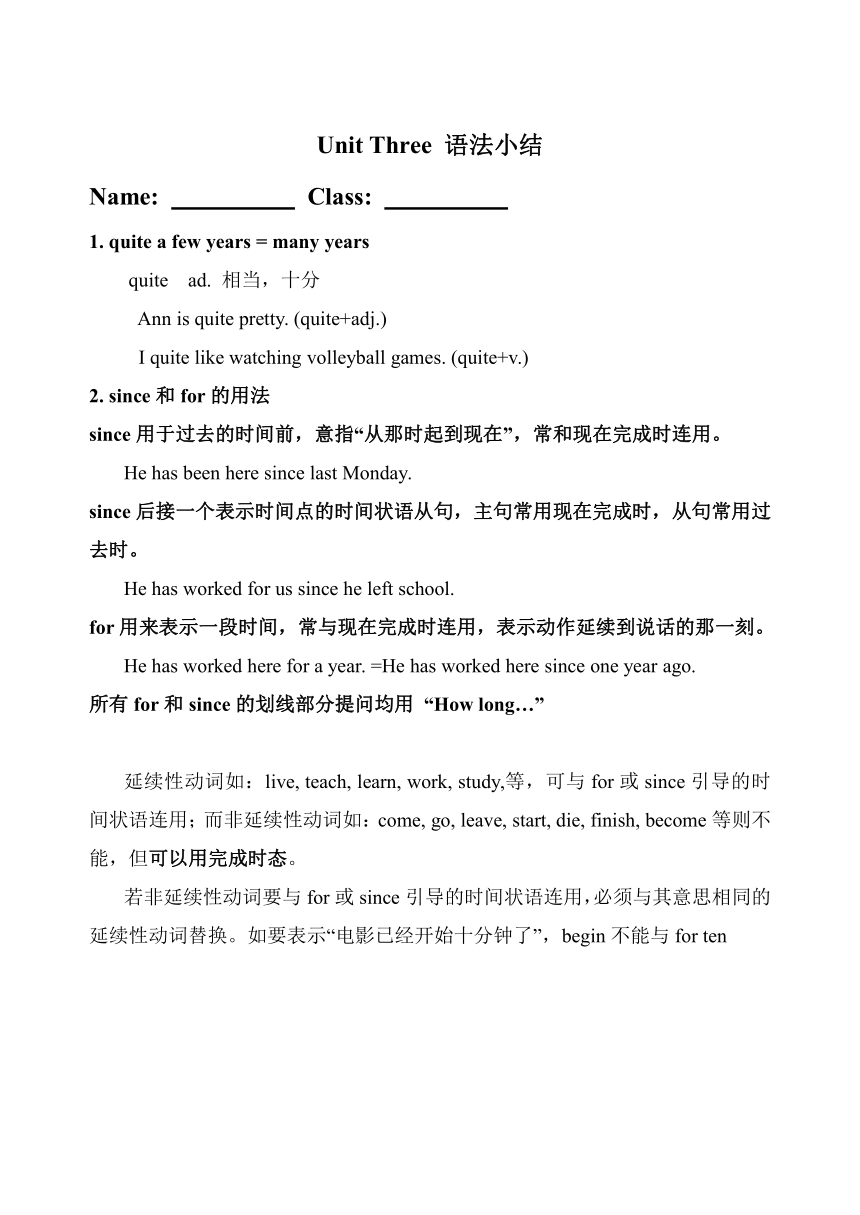
Unit Three 语法小结 Name: Class: 1. quite a few years = many years quite ad. 相当,十分 Ann is quite pretty. (quite+adj.) I quite like watching volleyball games. (quite+v.) 2. since和for的用法 since用于过去的时间前,意指“从那时起到现在”,常和现在完成时连用。 He has been here since last Monday. since后接一个表示时间点的时间状语从句,主句常用现在完成时,从句常用过去时。 He has worked for us since he left school. for用来表示一段时间,常与现在完成时连用,表示动作延续到说话的那一刻。 He has worked here for a year. =He has worked here since one year ago. 所有for和since的划线部分提问均用 “How long…” 延续性动词如:live, teach, learn, work, study,等,可与for或since引导的时间状语连用;而非延续性动词如:come, go, leave, start, die, finish, become等则不能,但可以用完成时态。 若非延续性动词要与for或since引导的时间状语连用,必须与其意思相同的延续性动词替换。如要表示“电影已经开始十分钟了”,begin不能与for ten minutes连用,那就要用be on来替换,译成:The film has been on for ten minutes. 瞬间动词 延续性动词 leave have been away from die have/has been dead begin/start have/has been on borrow have/has kept buy have had join have been in (have been a member of ) 3. 反意疑问句 (1). 反意疑问句中问句部分和陈述句部分构成相反关系,即前肯后否,前否后肯。 They’re very late for the meeting, aren’t they (2). 反意部分的助动词与陈述部分的动词要匹配,在时态上一致。 He has dinner at home every day, doesn’t he Tom has known the man, hasn’t he There are a lot of people on the road, aren’t there (3). 陈述部分若含有由un-, im-, in-, dis-等否定意义的前缀构成的词语时,陈述部分仍为肯定,反意部分要用否定。 Your father is unhappy, isn’t he It’s impossible to arrive there on time, isn’t it She dislikes staying at home alone, doesn’t she He failed to pass the test, didn’t he (4). 陈述部分带有little, few, never, hardly, seldom, rarely, nobody否定意义的词语时, 反意部分用肯定。 She never tells a lie, does she He was seldom late, was he (5). 陈述部分为I am…时, 反意部分为aren’t I I am a very honest man, aren’t I (6). 反意疑问句的回答形式类似于一般疑问句,回答从客观事实出发。 --Cathy is reading an English magazine now, isn’t she --_____ _. She is busy cleaning the house. --He isn’t a teacher, is he --_____. He has worked in this school for two years. waiter n. 男服务生 waitress n. 女服务生 wait v. 等待 wait for sb. 5. train v. 训练,培养 They are training for the boat race. Mother trained us to be honest. [联想] trainer 训练员 trainee 受训的人 train n. 火车 an express train 快车 6. headmaster 男校长 headmistress 女校长 principal 校长 7. machine n. [C] 机器 mechanic n. [C] 机械师, 机修工 8. engineer n. [C] 工程师 engine n. 引擎 9. use sth. to do = sth. be used to do use sth. for doing = sth. be used for doing We use water to wash clothes.= Water is used to wash clothes. We use fire for cooking.=Fire is used for cooking. tell the time 报时 tell the truth, tell a story, tell a lie, tell the difference 11. hold the keys 挂钥匙 hold v. (held, held) She is holding her raincoat ti ... ...
~~ 您好,已阅读到文档的结尾了 ~~